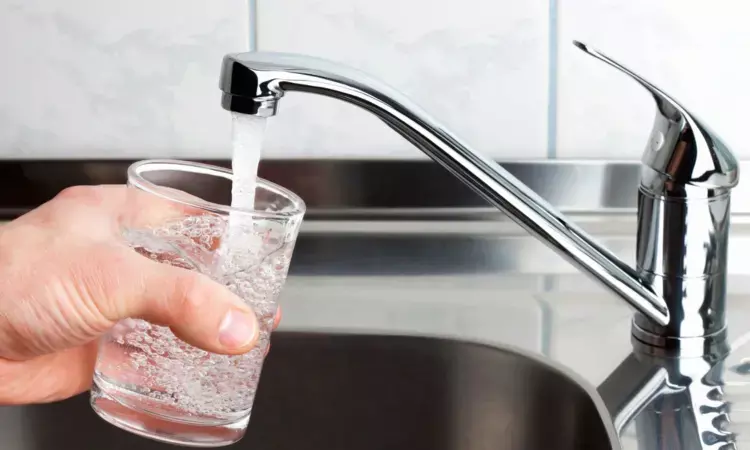- Home
- Medical news & Guidelines
- Anesthesiology
- Cardiology and CTVS
- Critical Care
- Dentistry
- Dermatology
- Diabetes and Endocrinology
- ENT
- Gastroenterology
- Medicine
- Nephrology
- Neurology
- Obstretics-Gynaecology
- Oncology
- Ophthalmology
- Orthopaedics
- Pediatrics-Neonatology
- Psychiatry
- Pulmonology
- Radiology
- Surgery
- Urology
- Laboratory Medicine
- Diet
- Nursing
- Paramedical
- Physiotherapy
- Health news
- Fact Check
- Bone Health Fact Check
- Brain Health Fact Check
- Cancer Related Fact Check
- Child Care Fact Check
- Dental and oral health fact check
- Diabetes and metabolic health fact check
- Diet and Nutrition Fact Check
- Eye and ENT Care Fact Check
- Fitness fact check
- Gut health fact check
- Heart health fact check
- Kidney health fact check
- Medical education fact check
- Men's health fact check
- Respiratory fact check
- Skin and hair care fact check
- Vaccine and Immunization fact check
- Women's health fact check
- AYUSH
- State News
- Andaman and Nicobar Islands
- Andhra Pradesh
- Arunachal Pradesh
- Assam
- Bihar
- Chandigarh
- Chattisgarh
- Dadra and Nagar Haveli
- Daman and Diu
- Delhi
- Goa
- Gujarat
- Haryana
- Himachal Pradesh
- Jammu & Kashmir
- Jharkhand
- Karnataka
- Kerala
- Ladakh
- Lakshadweep
- Madhya Pradesh
- Maharashtra
- Manipur
- Meghalaya
- Mizoram
- Nagaland
- Odisha
- Puducherry
- Punjab
- Rajasthan
- Sikkim
- Tamil Nadu
- Telangana
- Tripura
- Uttar Pradesh
- Uttrakhand
- West Bengal
- Medical Education
- Industry
Household Water Lead Linked to Hematologic Toxic Effects in Chronic Kidney Disease: JAMA

USA: Recent studies have unveiled a concerning correlation between household water lead levels and hematologic toxic effects in individuals with chronic kidney disease (CKD). This revelation underscores the intricate interplay between environmental factors and health outcomes, particularly in vulnerable populations.
The cross-sectional study of 6404 individuals with kidney failure suggests that commonly encountered drinking water lead contamination levels may have adverse health consequences among susceptible individuals.
"Low household water lead contamination levels were associated with higher erythropoiesis-stimulating agent dosing," the researchers reported in JAMA Internal Medicine. Low hemoglobin concentrations were observed among 2648 patients with data on advanced chronic kidney disease.
Chronic kidney disease affects millions worldwide, impairing renal function and often necessitating dialysis or transplantation for survival. Individuals with CKD are already predisposed to various health complications, including cardiovascular disease and anemia. The new research shows how environmental exposures, specifically to lead in household water, may exacerbate these risks.
Lead is a ubiquitous environmental contaminant, primarily entering water supplies through corroded plumbing systems or lead-containing pipes. Despite efforts to mitigate exposure, many households, particularly in older urban areas, still contend with elevated lead levels in their tap water.
Against the above background, John Danziger, Harvard Medical School, Boston, Massachusetts, and colleagues aimed to investigate whether commonly encountered levels of lead in household water are tied to hematologic toxicity among individuals with advanced kidney disease, a group known to have disproportionate susceptibility to environmental toxicants.
For this purpose, the researcher performed a cross-sectional analysis of household water lead concentrations and hematologic outcomes among patients beginning dialysis at a Fresenius Medical Care outpatient facility between 2017 and 2021.
Lead concentrations in household water were continuously examined in categorical proportions of the Environmental Protection Agency’s allowable threshold (15 μg/L).
Hematologic toxic effects were defined by monthly dosing of erythropoiesis-stimulating agent (ESA) during the first 90 days of incident kidney failure care and examined as three primary outcomes: a proportion receiving maximum or higher dosing, continuously, and by a resistance index that normalized to hemoglobin concentrations and body weight. Secondarily, hemoglobin concentrations for patients with data before kidney failure onset were investigated, overall, and among those with concurrent iron deficiency, thought to increase gastrointestinal absorption of ingested lead.
The following were the key findings of the study:
- Among 6404 patients with incident kidney failure, (65% males; mean age, 57 years) followed up for the first 90 days of dialysis therapy, 12% had a measurable lead in household drinking water.
- A higher category of household lead contamination was associated with a 15% (odds ratio [OR], 1.15) higher risk of maximum monthly ESA dosing, 4.5 μg higher monthly ESA dose, and a 0.48% higher monthly resistance index.
- Among patients with pre–kidney failure hemoglobin measures (n = 2648), a higher household lead categorization was associated with a 0.12 g/dL lower hemoglobin concentration, particularly among those with concurrent iron deficiency, among whom hemoglobin concentrations were 0.25 g/dL lower.
The study findings suggest that levels of lead found commonly in US drinking water may be associated with lead poisoning among susceptible individuals.
As policymakers and healthcare providers grapple with the multifaceted challenges of environmental health disparities, addressing the link between household water lead and hematologic toxic effects in CKD represents a critical step towards safeguarding the well-being of vulnerable populations.
Reference:
Danziger J, Willetts J, Larkin J, et al. Household Water Lead and Hematologic Toxic Effects in Chronic Kidney Disease. JAMA Intern Med. Published online May 28, 2024. doi:10.1001/jamainternmed.2024.0904
Dr Kamal Kant Kohli-MBBS, DTCD- a chest specialist with more than 30 years of practice and a flair for writing clinical articles, Dr Kamal Kant Kohli joined Medical Dialogues as a Chief Editor of Medical News. Besides writing articles, as an editor, he proofreads and verifies all the medical content published on Medical Dialogues including those coming from journals, studies,medical conferences,guidelines etc. Email: drkohli@medicaldialogues.in. Contact no. 011-43720751


